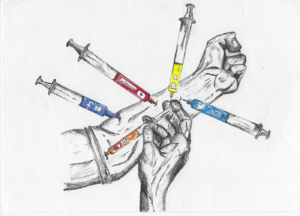Addiction is isolation.
In the moment and in the throes of substance abuse, it may well feel like you’re in the middle of everything. Constantly “in the mix” and surrounded by people, but in reality, that’s something of an illusion.
Everyone is there for the drugs and the drinks. When the drugs end, that camaraderie vanishes and you’re left alone again. The people that truly care about you, your friends and family, end up being pushed further and further away as that cycle of addiction continues.
You chase a high and, in a very real way, the connection with the people that go after it with you. They support and reinforce the using or the drinking.
Oddly enough, the same is true of getting clean. You actively pursue sobriety and your recovery is bolstered and benefited by a similar support system. The difference is it’s the right kind of support.
Establishing What Addiction Is
We’ll get into the various types of support groups in a second, before that though, let’s identify what addiction exactly is because it’ll help us understand why support groups are so effective.
The American Society of Addiction Medicine defines addiction as “a treatable, chronic medical disease involving complex interactions among brain circuits, genetics, the environment, and an individual’s life experiences. People with addiction use substances or engage in behaviors that become compulsive and often continue despite harmful consequences.”
There’s a keyword in there, “environment”, that helps explain a big benefit of support groups. If the environment you’re surrounded by is chock full of triggers, drug users and heavy drinkers, it affects you.
To a certain extent, we can become creatures of our environments. Not everyone, but it’s much more likely if that’s your environment and life experience.
Conversely, addiction support groups, full of sober-minded people promote and celebrate your recovery.
Sobriety becomes your environment. Pretty cool, no?
Different Types of Addiction Support Groups

After finishing up your residential inpatient treatment and/or outpatient care, the next step is aftercare and sober living, of which support groups are a part.
Now, naturally, each person is a unique individual and you don’t have to follow that trajectory at all. Some people require the full scope of treatment while others just need outpatient care or a support group. Your treatment is always catered to what you need.
12-Step Programs
These are the classics so to speak. The 12-step program is a long famous set of guidelines for overcoming addiction. They’re the gospel, and that word is chosen intentionally because the original 12-steps themselves are quite religious in nature. That said there are versions that are less overtly religious and more “spiritual”.
In addition to the steps themselves, what makes these programs work is the meetings. They’re free of charge and happen the world over. The idea is that you create friendships with recovery-minded people and build a system of both support and accountability.
- Alcoholics Anonymous – By far the most well-known of the 12-step programs is AA and that makes a lot of sense because that’s where the 12-steps themselves came from. Having been around since 1935, the staying power proves its effectiveness.
- Narcotics Anonymous – The success of AA led to the creation of NA, which for all intents and purposes is the same program but these are exclusively drug addiction support groups.
SMART Recovery – For those that want an entirely different approach to support groups, that has no spiritual or religious component, SMART Recovery is the ticket. SMART, which stands for Self-Management and Recovery Training, describes their support meetings (also free) as for those seeking science-based, self-empowered addiction recovery.
Let All American Detox Help You Get Sober
Needless to say, support groups play a big role in a sustained and fruitful recovery. Importantly, they’re something you can utilize without having gone to rehab first. If you have questions for yourself or a loved one about finding a group that works for you, reach out to us at All American Detox and we’d be happy to help you find the best option.





